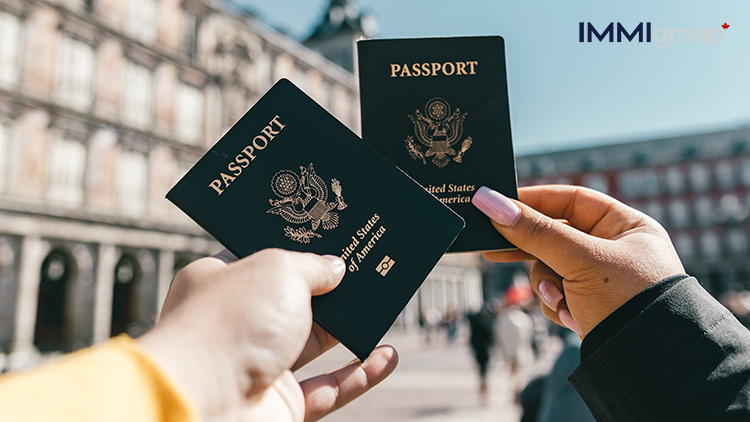Revoking Citizenship in Canada and the USA

With Bill C-24, Strengthening Canadian Citizenship Act, revocation of citizenship becomes a possibility for naturalized Canadians who have committed terrorist acts or engaged in criminal activities while outside of Canada. While groups like the Canadian Bar Association have expressed concerns, and legal challenges have been mounted, the government has stated it is merely concerned with those who perform, or support in a number of ways, terrorist acts, and other criminal activities, or certain activities contrary to the national interests of Canada. The new law includes any Canadian citizen who performs, or aids, terrorist acts, as well as acts of espionage against Canada.
In the United States, a natural born US citizen cannot have their citizenship revoked, but can renounce their citizenship. Naturalized citizens, however, can have their citizenship revoked under certain conditions. The process is called denaturalization and there are several grounds for being denaturalized.
Customs and Immigration by TheTruthAbout… / Wikimedia Commons / CC BY-SA 2.0
With Bill C-24, Strengthening Canadian Citizenship Act, revocation of citizenship becomes a possibility for naturalized Canadians who have committed terrorist acts or engaged in criminal activities while outside of Canada. While groups like the Canadian Bar Association have expressed concerns, and legal challenges have been mounted, the government has stated it is merely concerned with those who perform, or support in a number of ways, terrorist acts, and other criminal activities, or certain activities contrary to the national interests of Canada. The new law includes any Canadian citizen who performs, or aids, terrorist acts, as well as acts of espionage against Canada. The previous reasons for having one’s citizenship revoked are still in place as well. As outlined by Canadian Citizenship and Immigration’s website, they are:
- If a person obtained their Canadian citizenship through false representation.
- If a person obtained their Canadian citizenship through fraud.
- If a person obtained their Canadian citizenship while knowingly concealing material circumstances.
If any of these conditions apply, then that person is deemed by the Act to have obtained their Canadian citizenship unlawfully, and a process of revoking their citizenship is set in motion. A referral for possible revocation – that would mean someone or some authority informing CIC that a person may have obtained their citizenship through unlawful means – usually comes from a number of sources:
- Immigration authorities.
- CBSA: the Canadian Border Services Agency, the federal agency responsible for border enforcement, immigration enforcement, and customs services.
- External or foreign enforcement agencies or missions.
- Poison-pen letters from individuals denouncing possible illegal acquisition of Canadian citizenship.
The actual process of revocation involves several steps, and has been denounced by the CBA as being a paper-based one in which the right of personal appeal does not exist. Here is how the process unfolds in Canada:
- The Minister of Citizenship and Immigration sends an official letter to the person affected, stating the Minister’s intention of recommending to the Governor in Council that the affected person’s citizenship be revoked.
- The affected person then informs the Minister whether they wish the case to be referred to Federal Court. They have 30 days in which to do this.
- A person under revocation proceedings continues to enjoy the full rights and privileges of Canadian citizenship until, and if, their citizenship is revoked by a Governor in Council order. Until the Order in Council has established in writing the date of revocation, or the Federal court has dismissed the Minister’s case for revocation, the case file is maintained as open.
- There is no right of appeal. The Federal courts’ decision is final.
- If the Federal court finds that citizenship was acquired unlawfully, then the Minister reports to the Governor in Council which decides whether or not to revoke citizenship. If the decision is made to revoke citizenship, it is issued as an order in council by the Governor in Council.
- A subject in Canada whose citizenship has been revoked, based on unlawful entry, is without status and is reportable under section 44(1) of the Immigration and Refugee Protection Act and may be deported.
- If the person entered Canada lawfully, but then acquired citizenship unlawfully, then revocation does not cause deportation but, rather, results in the person reverting to permanent resident status.
- Any person whose citizenship has been revoked must wait 5 years before applying again for Canadian citizenship.
In the United States, a natural born US citizen cannot have their citizenship revoked, but can renounce their citizenship. Naturalized citizens, however, can have their citizenship revoked under certain conditions. The process is called denaturalization and there are several grounds for being denaturalized:
- As in Canada, any falsification or concealment of facts made by a person who is applying for their US citizenship is grounds for denaturalization.
- For the first 10 years of your US citizenship, you may not refuse to testify before Congress on any subversive activity that Congress may be investigating and to which your testimony may be relevant. Failure to do so is grounds for denaturalization.
- If you join a subversive organization within 5 years of becoming a naturalized US citizen, then your citizenship may be revoked through denaturalization.
- US citizenship can be granted by virtue of serving in the US military, but if you are dishonourably discharged before serving 5 years in the military, it is considered grounds for denaturalization.
The denaturalization process begins with a complaint being filed against the defendant who then has 60 days to respond to the complaint and decide whether to hire an attorney or to defend themselves at a trial in federal court. There is a high burden of proof that must be met in court to establish that a citizen was not eligible for naturalization, or procured naturalization by willful concealment or material misrepresentation. The burden of proof is higher than in most civil cases, but not as high as in most criminal cases. Once a verdict has been issued denaturalizing a former US citizen, they may be deported. In the US, unlike in Canada, there is the right of appeal available to anyone who has had their citizenship revoked by a lower court decision.

